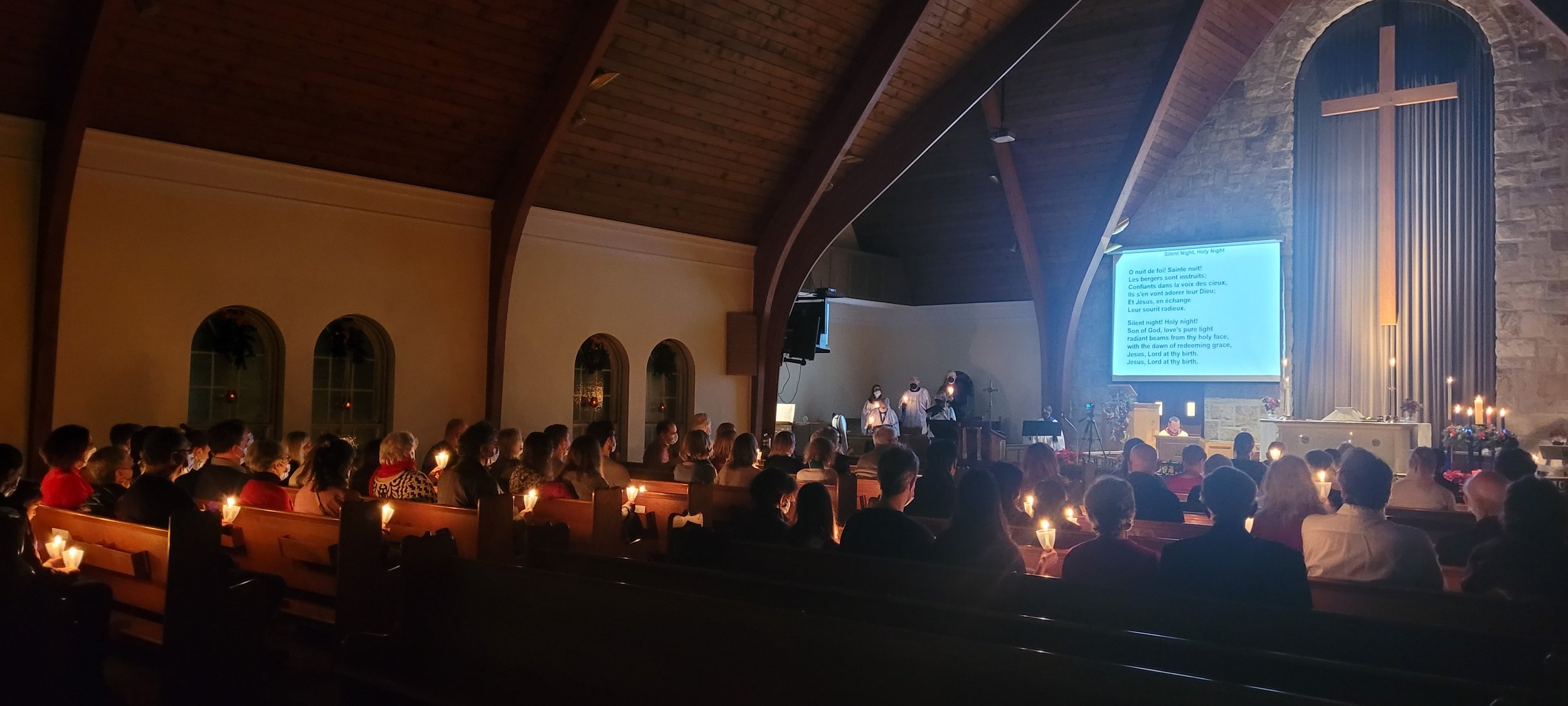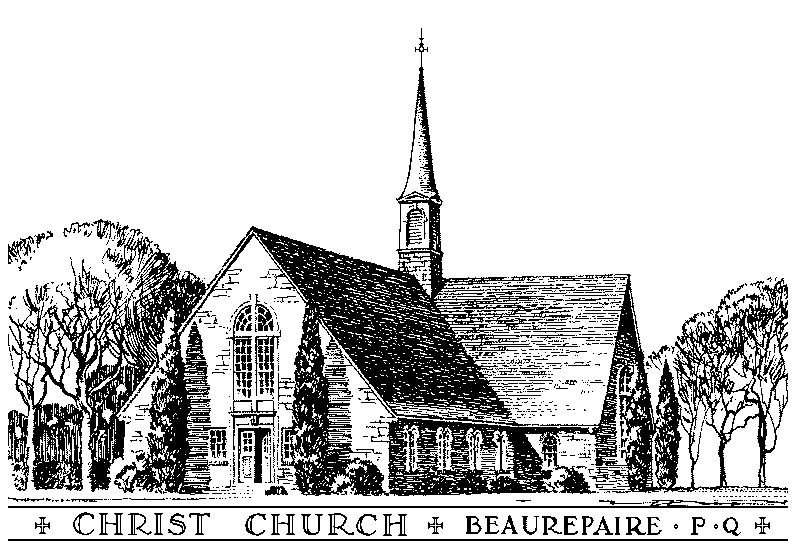
Worship & Liturgy
The great Anglican priest and theologian John Wesley once said, “There is no such thing as a solitary Christian”. This means that Christianity is not an individualistic philosophy. To be a Christian means being a member of the Body of Christ – the world-wide community of Christ’s followers. We become a member of the Body of Christ through the Sacrament of Baptism, and we express our unity as the Body of Christ through service, prayer, fellowship and worship TOGETHER.
We gather at least once a week – and on special holy days – to pray, sing, learn and celebrate the sacraments together. This is what we call worship.
At Christ Church Beaurepaire we worship in the richness of the Anglican tradition, blending the beauty of traditional liturgy and music with contemporary influences and inclusive values.
Sacraments
When God took on flesh in Jesus Christ, the uncreated and the created, the eternal and the temporal, the divine and the human became united. This unity meant that all that is mortal now points to the immortal, all that is finite now points to the infinite. In and through Jesus all creation has become like a splendid veil, through which the face of God is revealed to us.
This is called the sacramental quality of the created order. All that is is sacred because all that is speaks of God's redeeming love. Seas and winds, mountains and trees, sun, moon, and stars, and all the animals and people have become sacred windows offering us glimpses of God.
-Henri Nouwen
Anglican worship is sacramental, meaning that it is rooted in and centred around the core sacraments of the Church. The Book of Common prayer defines the sacraments as “outward and visible signs of inward and spiritual grace, given by Christ as sure and certain means by which we receive that grace”. In other words, sacraments are symbols and channels of God’s grace and love.
Holy Eucharist
Holy Eucharist – also known as Holy Communion, the Lord’s Supper, or the Mass – is central to Christian life and worship in the Anglican tradition. We celebrate Holy Eucharist every Sunday morning when we gather as a community to worship.
The word “eucharist” is derived from the Greek word for “thanksgiving”. From the earliest days of the Christian community nearly 2000 years ago, Christians have gathered on Sunday to celebrate and give thanks to God through prayer, song, teaching and gathering around Christ’s table (the altar) for a sacred meal of bread and wine.
This sacred meal of bread and wine represents Christ’s body and blood and embodies Christ’s living mystical presence among us and within us, and assures us of God’s abundant love for us.
All baptized Christians of any age or denominational affiliation are welcome to receive the Sacrament of Holy Eucharist at Christ Church.
Holy Baptism
Baptism is the sign of new life in Christ. Baptism unites Christ with his people. That union is both individual and corporate. Christians are, it is true, baptized one by one, but to be Christian is to be part of a new creation which rises from the dark waters of Christ’s death into the dawn of his risen life. Christians are not just baptized individuals; they are a new humanity.
- The Book of Alternative Services
The Rite of Christian Initiation, i.e. Holy Baptism, is the sacrament through which we become members of the Body of Christ – the Church. Baptism is the sacrament of new birth, and as such we receive the Sacrament of Baptism only once in our life.
In the Anglican tradition anyone of any age may receive the Sacrament of Baptism, though baptism of infants is common. Christian parents are encouraged to present their children for baptism at an early age. Baptism expresses God’s grace and love working in our lives before we are even aware of it – God chooses us before we choose God. Baptism of infants is a powerful symbol of this truth.
Baptism is much more than a naming ceremony, or a family celebration of new life. In fact, baptism has several layers of meaning:
Baptism is first of all a sacrament of the church. By sacrament we mean a tangible sign of God’s love and relationship with God’s people. Baptism is a sacrament because it testifies to God’s favor towards us. This favor is unearned and unmerited and can therefore be seen as a sign of God’s grace.
Baptism is a sacrament of initiation. Through it the individual is initiated by water and the Holy Spirit into Christ’s Body the Church. This initiation creates an indissoluble bond between God and the newly baptized.
Baptism is also a sacrament of membership. Through it the individual becomes a full member of the universal Church of Christ.
Baptism is a sacrament of relationship. Through it God initiates a new relationship with the individual as a member of the Church. In this way the individual’s relationship with God is set in the context of the Christian community. The individual’s new relationship with the community is that which nurtures the individual and communal relationship with God.
Baptism is a sacrament of covenant. In baptism God enters into a covenant of grace with us. In response, we commit ourselves to strive to live our life in accordance with the teachings of Christ. In the baptismal rite the priest asks the candidate, their sponsors and the congregation the following six questions which outline our baptismal promises:
Will you continue in the apostles’ teaching and fellowship, in the breaking of bread, and in the prayers?
Will you persevere in resisting evil and, whenever you fall into sin, repent and return to the Lord?
Will you proclaim by word and example the good news of God in Christ?
Will you seek and serve Christ in all persons, loving your neighbour as yourself?
Will you strive for justice and peace among all people, and respect the dignity of every human being?
Will you strive to safeguard the integrity of God's creation, and respect, sustain and renew the life of the Earth?
Due to its significance as a sacrament of membership in the Body of Christ, Baptism is normally celebrated at the principal Eucharistic service of the week (usually Sunday morning). If you’re interested in getting baptized or having your child baptized, please contact the church office.
Pastoral Rites
Weddings
Holy Matrimony – Christian marriage – is a lifelong commitment entered into by two people before God through the marital rites of the Church. In addition to the elements one would expect in a civil marriage ceremony, such as the exchange of vows and perhaps the exchange of rings, the Anglican marriage service includes a blessing of the couple by the priest, and oftentimes a celebration of Holy Eucharist.
The Anglican Diocese of Montreal supports full marriage equality for all couples. Couples who have already been married in a civil ceremony may request to have a Celebration and Blessing of a Civil Marriage in the church. Couples seeking to be married at Christ Church do not necessarily have to be parishioners, but at least one of the couple must be a baptized Christian. Couples must also comply with all legal requirements for marriage under Quebec law and also must undergo marriage preparation – the priest will recommend suitable marriage preparation courses.
To start planning your wedding please see our Rentals page.
Funerals
Like birth, death is a universal human experience. And as we human beings have special rituals to celebrate new life, marriage and other rites of passage, so too all cultures have rituals to celebrate the life of lost loved ones and morn their loss. In the Christian tradition we acknowledge the sadness of death and affirm the reality of death – even God in Christ experienced death on the Cross. But we also live in the hope of the Resurrection – the great truth of the Christian faith that death does not have the final word – that in Christ we have eternal life.
Funerals in the Anglican tradition normally take place in the church and oftentimes include a celebration of Holy Eucharist. Our priest will help you to plan a funeral service which appropriately honours your loved one, through selection of appropriate music, readings and other liturgical elements. Parishioners are welcome to pre-plan their own funeral so that the service will reflect their wishes, including prayers, readings and music.
Funerals at Christ Church are not restricted to parishioners – anyone desiring a dignified Christian funeral service in the Anglican tradition for themselves or their loved one is welcome. To begin making funeral arrangements please contact the church office.
